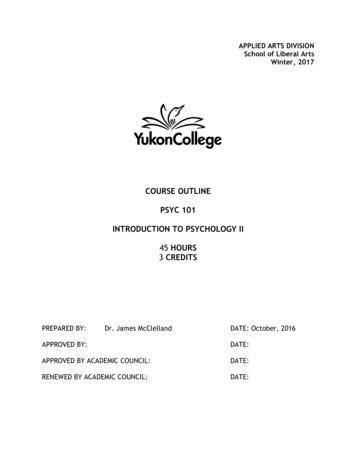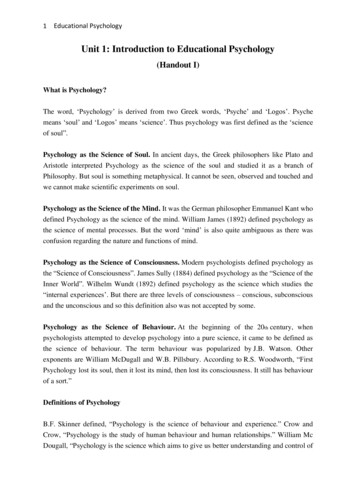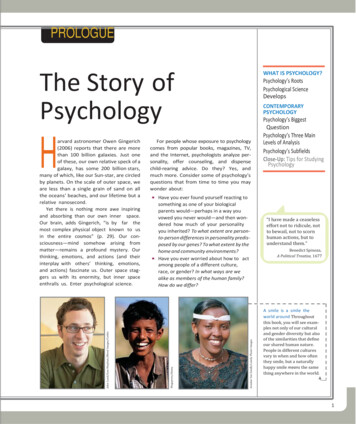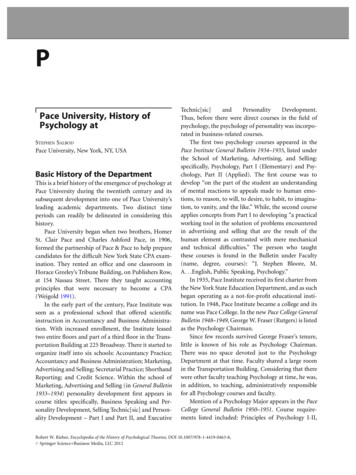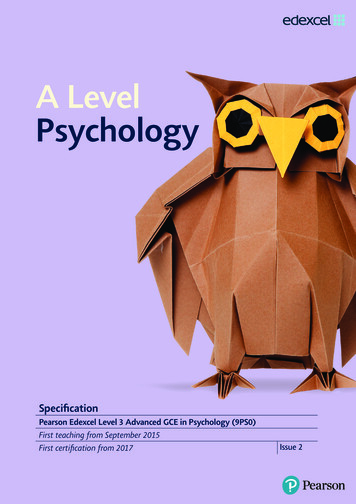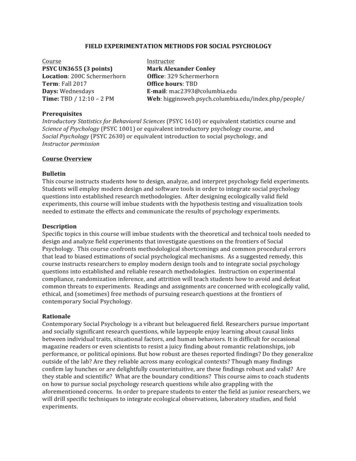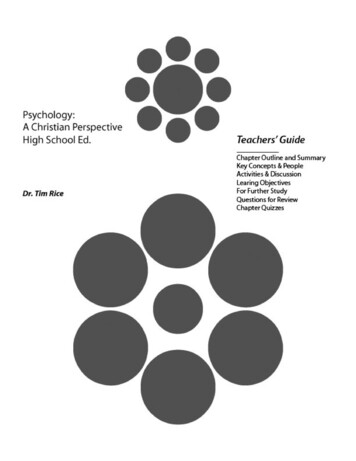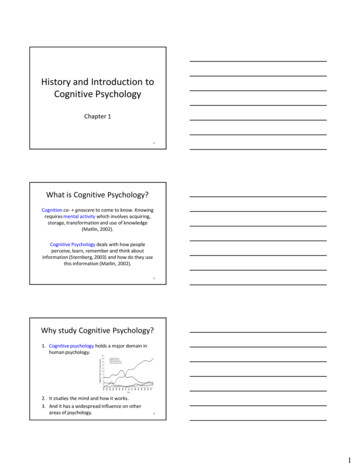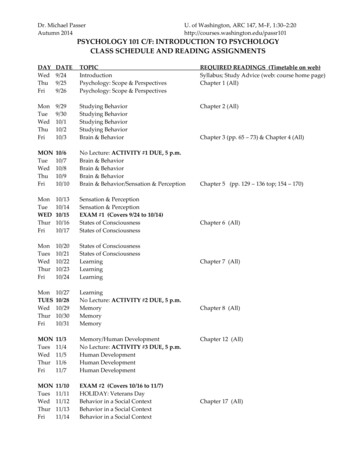
Transcription
Dr. Michael PasserAutumn 2014U. of Washington, ARC 147, M–F, SYCHOLOGY 101 C/F: INTRODUCTION TO PSYCHOLOGYCLASS SCHEDULE AND READING uctionPsychology: Scope & PerspectivesPsychology: Scope & PerspectivesREQUIRED READINGS (Timetable on web)Syllabus; Study Advice (web: course home page)Chapter 1 (All)MonTueWedThuFri9/299/3010/110/210/3Studying BehaviorStudying BehaviorStudying BehaviorStudying BehaviorBrain & BehaviorChapter 2 (All)MONTueWedThuFri10/610/710/810/910/10No Lecture: ACTIVITY #1 DUE, 5 p.m.Brain & BehaviorBrain & BehaviorBrain & BehaviorBrain & Behavior/Sensation & 7Sensation & PerceptionSensation & PerceptionEXAM #1 (Covers 9/24 to 10/14)States of ConsciousnessStates of 10/24States of ConsciousnessStates of ConsciousnessLearningLearningLearningChapter 7 rningNo Lecture: ACTIVITY #2 DUE, 5 p.m.MemoryMemoryMemoryChapter 8 uman DevelopmentNo Lecture: ACTIVITY #3 DUE, 5 p.m.Human DevelopmentHuman DevelopmentHuman /14EXAM #2 (Covers 10/16 to 11/7)HOLIDAY: Veterans DayBehavior in a Social ContextBehavior in a Social ContextBehavior in a Social ContextChapter 3 (pp. 65 – 73) & Chapter 4 (All)Chapter 5 (pp. 129 – 136 top; 154 – 170)Chapter 6 (All)Chapter 12 (All)Chapter 17 (All)
OPICBehavior in a Social ContextPersonalityPersonalityPsychological DisordersPsychological 8Psychological DisordersChapter 15 (All)Psychological DisordersNo Lecture: ACTIVITY #4 DUE, 5 p.m.HOLIDAY: ThanksgivingHOLIDAY: herapyTherapyTherapyTherapyTherapy/Wrap-UpMON 12/8REQUIRED READINGS- Page 2Chapter 13 (All)Chapter 16 (All)EXAM #3 (Covers 11/12 to 12/5)Time: 2:30 - 3:30, ARC 147EXAM #3 cannot be given at an earlier date/time for any reason. You need to behere on 12/8 for exam 3. Don’t make plans to start winter break until after the final.Exam 3 starts at 2:30 p.m. Like Exams 1 and 2, it is not cumulative, has 40 items, and lasts 50minutes. Your “My UW” page may show the exam as 2:30 to 4:20. This is incorrect. BecauseExam 3 is a regular exam, weʹre only using the first 50 minutes of our official time slot.ADDITIONAL COURSE INFORMATIONA.Instructional StaffInstructor:T.A. FellowT.A.T.A.WEBSITEE-MAILMESSAGES,QUESTIONS,& PROBLEMSB.NameMichael PasserBrianna YamasakiMi-Seon KongKaren hrie 238Guthrie Annex 4, Room 103Guthrie Annex 4, Room 103Guthrie Annex 4, Room 103Office Hourssee course websitesee course websitesee course websitesee course websitehttp://courses.washington.edu/passr101 (Note: That’s passr101, not passer101.)passr101@u.washington.eduSee us after class or during office hours. If these times don’t work, let us know andwe’ll try to arrange a time to meet with you. Send messages and questions to thecourse e-mail account. Daytime Monday through Friday we will check e-mail onceor twice per day and try to reply the same day or by the end of the next school day.Purpose of CourseThis course will provide you with a general understanding of what psychology is about, why it isimportant, and why many of us find it a fascinating topic to study. You will learn about the basic subjectmatter of psychology, various subfields and theoretical perspectives, how psychologists study behavior,and how psychological knowledge has been applied to improve the quality of life. This course is aprerequisite to more advanced psychology courses. The topics covered in this class are explored morefully in these advanced classes. Thus, if you are thinking of majoring in psychology or simply wish tolearn more about it, this course can help you decide what areas (i.e., subfields) of psychology are mostinteresting to you and, therefore, what advanced courses you might want to take.
- Page 3 C.D.Learning Goals1.Knowledge of Psychology: My basic goal is to increase your knowledge of psychology. This isthe only goal that will be evaluated directly by exams and it includes enhancing your knowledgeand understanding of: a) major psychological approaches to the study of behavior; b) major issuesin psychology; c) concepts, basic terminology, research findings, and applications of psychologicalwork; d) the research process and its limitations; and e) psychology's important contributors.2.Scientific Values and Skills: I hope that this course will stimulate your intellectual curiosityabout human behavior, increase your appreciation of the scientific method, help you recognizefaulty or biased research, and increase your ability to critically evaluate scientific information.3.Everyday Life: I hope the information in this course will increase your understanding of otherpeople's and your own behavior, help you to appreciate the complexity of human behavior, andpromote an intelligent skepticism about accepting psychological "facts" and "truths" that you comeacross in everyday life (e.g., in news reports and "pop" web articles, on T.V. and radio talk shows).TextbookREQUIRED: M. W. Passer & R. E. Smith, 5th Edition (2011). Psychology: The Science of Mind andBehavior (Paperback Custom U.W. Edition), Boston: McGraw-Hill.The U.W. Bookstore sells the paperback U. W. custom edition. I have deleted several chapters (Chapters9, 10, 11, and 14) from this custom edition to reduce the book’s price. I do not cover thesechapters/topics in my course. There also is a hardcover national version (5th edition, 2011) that contains allthe chapters, but is more expensive. The bookstore doesn’t carry it. If you want the hardcover textbook,do an online search of booksellers. An e-book version also is available: it has all the chapters, but costsless than the hardcover text or paperback custom text. For the e-book, get an access code card in thetextbook section at the U.W. Bookstore or go to http://www.bookstore.washington.edu. Either way – ifyou use a hardcopy version or e-book version – you’ll be skipping Chapters 9, 10, 11, and 14 as notedabove.Several copies of the textbook are on 4-hour reserve at the Odegaard Library (OUGL) Reserve Desk. Iadvise against using an earlier edition of the textbook: see my explanation nfo.htmlE.Relation Between Lectures and Textbook.Classes will consist of lectures, videos/films, demonstrations, and possibly some guest speakers. Somematerial covered in the textbook will be covered in lecture, because both the text and I will coverconcepts, terms, theories, and research findings that are of central importance in psychology. Theamount of overlap will vary depending on the topic. For some topics the lectures and text will overlap alot; for others they will overlap only a little. In general the lectures are not designed simply to repeat orexplain the chapters. Rather, lectures will introduce some material that is not in the text, and time will bedevoted to films and demonstrations so that you can learn about psychology in ways not possiblethrough the textbook alone. Therefore, as you may find in many of your other college classes, there is alot of material in the assigned chapters that will not be covered in class, and which you will need tolearn on your own. If you are seeking a class that does not require a lot of independent reading (i.e., a classwhere most of the material covered in the textbook also is covered and explained in class) then do not take thiscourse. There is a lot of independent reading and that text material will be included in the exams. We will haveoffice hours and chapter study sessions if you want assistance in learning this material.
- Page 4 F.Grading Policies1.2.3.Exams: There are 3 Exams, each with 40 multiple choice questions, worth 1 point each. Exams are noncumulative (i.e., each exam covers a different set of lectures and readings). Exam questions are basedon ALL material presented in lecture and ALL material in the assigned chapters (even if thetextbook material is not discussed in lecture).ALL 3 EXAMS ARE REQUIRED AND COUNT TOWARD YOUR FINAL GRADE, AS FOLLOWS:a)Your two highest scores will each count as a full exam (maximum 40 points EACH)b) Your lowest score will count only half as much as each of your better exams(maximum 20 points)To repeat, the formula for computing your total points from exams is:Highest Exam Score Second Highest Exam Score (Lowest Score) 100 possible points.2Online Activities: (12 points): There are 4 required online activities, performed outside of class.Each is worth 3 points and promotes one or more of the course Learning Goals. For most students,each one takes about 30 to 60 minutes. Each activity must be completed by its Due Date. No pointswill be awarded for an activity completed after its Due Date.Class Participation Unit (13 points): A Turning Point Classroom Response System will be used togauge student participation. You need to purchase (required) a Turning Point response card (i.e.,“clicker”) and bring it to each class. Turning Point collects student responses to items I will presentin lecture (e.g., knowledge check and opinion questions). We will use clickers in most lectures.You will be graded on your own percentage of participation (i.e., over the Quarter, the total # ofitems you respond to divided by the total # of clicker items presented in lecture), and not by thecorrectness of your responses. Points Awarded: 80% participation rate all 13 points; 75 to79% 12 points; 70-74% 11 points, and so on, by 5% increments. Less than 20% 0 points.CLICKER REGISTRATION & ACADEMIC HONESTY: To receive participation credit, you needto register your clicker online. See the course homepage for detailed instructions. Also see SectionG3 on Page 6 of this syllabus for the academic honesty policy about clicker use.4.Course Grades. At the end of the term, grade points will be assigned according to the gradingscale shown below. This is a "guaranteed minimum grade scale". If you achieve a given pointtotal, your final course grade cannot be lower than the grade on the scale. Your final grade may behigher, as will be explained in the next section (F5: “Back-up Curve”). In sum, there are:3 Exams (100 pts) Online Activities (12 pts) Class Participation (13 pts) 125 possible points.Course Grading 7-8685848382-0CourseGrade1.31.21.11.00.90.80.70.0 (F)Note:Please be aware that 0.7 is the lowest passing grade used at the U.W. Anygrade below that is a 0.0 (the grades 0.1 to 0.6 are not used at the U.W.).
- Page 5 Course Grade Example: Terry’s exam scores are 29, 34, 31. Her lowest score is divided by 2, so29/2 14.5, which is rounded up to 15. So, her total exam points (out of 100 possible points) are 15 34 31 80. Terry gets 12 points for doing all the online activities by their due dates, and 13points for her clicker participation rate of 89%. Using the grading scale, 105 points a grade of 2.7.5."Back-up Curve": If less than half of all students who have taken all 3 exams receive a coursegrade of 2.5 or above. In this event, everyone's course grade will be curved up until 50% of theclass receives a 2.5 or higher. After all the exams are completed, I will determine whether therewill be a curve based on the "total points" distribution for the entire class. If 50% or more of theclass is getting a 2.5 or above, then no curve will be used. Remember, the decision as to whetherthere will be a curve is made after all 3 exams are completed. A curve IS NOT applied to eachexam individually.6.Appeal Procedure. If your answer to an exam question is marked as being incorrect but you feel itis correct, you may contest the question by writing an appeal. The written appeal must be based onmaterial presented in the book or in lecture (indicating chapter, page, line and specific quote); it cannot bebased on your personal opinion or experience. Appeals for Exams 1 and 2 must be handed in toone of the T.A.s or the T.A. Fellow (or placed in their mail box) within one week after the answerkeys are posted. For Exam 3 (final exam) the answer key will be posted about one to two hoursafter the exam on Monday, Dec. 8, and appeals must be turned in by noon the next day (i.e., bynoon, Tuesday, Dec. 9). We will review the appeal and give credit if appropriate.7.Scantron Exam Sheets. To take an exam, you must have a purple scantron form so that your testcan be computer scored. Purchase forms at the U.W. Bookstore or the Newsstand at By George inthe undergrad library (OUGL). We do not supply scantron forms in class.8.Exam Score Delays. If you make an error filling in the "bubbles" on your scantron exam form foryour student number, name, or test version, this will cause a delay in getting your exam score toyou. For example, when you try to look up your exam score online, there may be no score. Tocorrect such problems you may need to go to one of the T.A. office hours and help the T.A. findyour computerized form. Thus, please be careful in filling in this information on your exam sheets.9.Incompletes. Only students with special circumstances beyond their control who have obtainedpermission from Dr. Passer are eligible for a grade of Incomplete.Please note: Incompletes will NOT be given out at the end of the quarter simply as a way to"take the course over again" in the case of a bad grade in the course. If your grade isn't what youneed or want, come to office hours during the quarter and the T.A.s and I will try to assist youand help you learn the material. Don't wait until it's too late.10. Make-Up Policies: EXAMS: Make-up exams will be granted only under legitimate, unavoidablecircumstances (e.g., documented serious illness, family emergency). The standard make-upprocedure will be to take a short-answer written make-up exam this quarter. If you are facing aunique circumstance -- an illness, emergency, or whatever -- that you think may impair your ability toperform well on an exam, contact me or a TA as soon as it arises so that we can discuss whether a make-up orIncomplete will be granted. DO NOT WAIT until after you have taken an exam to tell me that your scorewas low because of some unique circumstance. ONCE YOU TAKE AN EXAM, THAT SCORE COUNTSNO MATTER WHAT. Contact us ahead of time.ONLINE ACTIVITIES, PARTICIPATION POINTS: In general, there are no make-ups for missedactivities or participation points. To account for the fact that you might miss some class days due toillness or other reasons, I have already set the participation grading so that you only need a rate of80% to receive full credit. Absence caused by official university business (e.g., intercollegiateathletics) and documented prolonged illness ( 1 week) will be handled on an individual basis.
- Page 6 -G.11.Extra Credit Participation in Research. Extra credit points can be earned by participating inresearch approved by the Department of Psychology for that purpose. You will receive moreinformation in class later this week or next week. The Psychology Subject Pool olcontains information and is the place where a) you register to participate in the extra creditprogram, and b) you search for available experiments and sign up to participate in them. For each 2hours of research participation your grade point will be raised by 0.1, up to a maximum amount of0.3 grade points (i.e., 6 hours of participation maximum). Your point total for the course will becalculated as described earlier, if necessary the curve will be used, and lastly, the extra credit gradepoints will be added to produce your final course grade. So, continuing the grading example fromthe top of page 5, if Terry has 105 total points from the exams and online activities, and alsoparticipated in 6 hours of research, then Terry's grade would increase from a 2.7 to a 3.0. If Terrydid 2 hours of research, her grade would increase from a 2.7 to a 2.8.12.A Final Note on Grading. The grading system in this course applies to all students equally. Someflexibility is built into the grading system, namely, your lowest exam score is discounted by 50%: itcounts only half as much as each of your two highest exam scores. In addition, you can earn extracredit as a research participant. Sometimes, a student will ask me if she or he can re-take a test or do sometype of additional extra credit (e.g., a report, paper, project, etc). to raise their course grade. My answer willalways be "No" because I don't make special grading opportunities available to some students but not toothers. So please, do not even ask. If you are having trouble mastering the course material be sureto take advantage of the office hours and CLUE sessions held each week, and the review sessionsheld before each exam. We are here to help you learn. Please don't wait until the end of the quarter tosee us. By then it will be way too late.Exam/Classroom Procedures1.Assigned Seating for Exams. You will be given an assigned seat for exams and must sit in this seatduring all exams. If your seat is vacant during the exam you will receive a zero for that exam.Your seat assignment will be posted on the course website. Prior to making seat assignments wewill ask you if you have any special needs (e.g., left-handed desk). The use of assigned seats onexam days allows me and the TAs to verify which students are absent. We will post the assignedseats several days before the first exam.2.Materials Needed for the Exams. Be sure to bring to each exam the following items:a.A purple "SCANTRON" SHEET. It can be obtained from the UniversityBookstore, HUB, or various cafes on campus (e.g. “By George” newsstand, beneath theundergraduate library, which is called OUGL).b.2 SOFT LEAD #2 PENCILS WITH ERASERc.STUDENT IDENTIFICATION NUMBERd.SEAT ASSIGNMENT3.Academic Honesty. The following remarks aren't meant to offend anyone's sense of honesty, butit's best to discuss academic honesty up front. It is expected that during exams each student willdo her or his own work. Looking at other students' exams, using notes or an electronic device, orany other behavior indicating outside assistance constitutes cheating. Similarly, for the onlineactivities, you should perform each one by yourself. For class “clicker” participation, you mayonly use your own clicker. Responding for someone else or with someone else’s clicker, or askingsomeone else to respond for you, represents cheating. If cheating occurs a grade of zero ("0") willbe given for that exam, online assignment, or the cumulative class participation unit (i.e., you willreceive no clicker participation points for the quarter). The campus representative who handlescheating cases will be notified and will determine what further disciplinary action will be taken.
- Page 7 H.CLUE and Study Skills Assistance CLUE: Beginning in Week 2 of the quarter, we will offer one evening study/enrichment session perweek at the Center for Learning and Undergraduate Enrichment (CLUE) at Mary Gates Hall. TheCenter is only open in the evenings. See the CLUE link on our course website. If you need help with the material or study techniques, see one of us during our daytime officehours. We can discuss your approach to studying and make suggestions. A structured program of improving study skills may be offered by the University Counseling Centerat 401 Schmitz Hall (phone number 543-1240). There usually is a fee for this program. If you'reinterested, contact the Center as soon as possible. You can find advice on how to develop good study skills in your textbook. See:How to Enhance Your Academic Performance: pages 26--27;Using Operant Principles to Modify Your Behavior: pages 236--237;Improving Memory and Academic Learning: pages 288--289;Do You Know the Material as Well as You Think You Do? pages 324 --325I.Lecture Outlines, Audio Recordings, and In-Class Films/VideotapesI don’t post lecture notes, but lecture outlines (i.e., topic headings/subheadings) and audio recordings(starting by Week 2) of lectures will be posted on the course website, usually within two school daysafter the lecture. Audio recordings are useful if you miss a lecture or want to listen to lecture materialagain. However, they are not a substitute for regularly attending class. Students who wish to make theirown audio recordings of lectures may do so for personal use. NOTE: Stuff happens, and some dayselectronic gremlins may cause podcasting equipment to malfunction. If so, you’ll need to get lecturenotes from a classmate. Finally, I will be showing segments of films and videotapes during somelectures. You will need to be in class to see these films/videos. For several reasons, in a class of 300 students wecannot arrange "individual showings" for students who miss a film or videotape.J.Class Meetings: CELL PHONES OFF, LAPTOP POLICY, and Other RequestsCell Phones/Texting: Please turn your cell phone off before entering class. Ringing cell phones disruptthe entire class, and texting during lecture distracts classmates near you. If you are expecting a vital callor text that may come during lecture, then do not come to class that day. During films and videos, again,please keep your cell phone turned off.Laptop/Tablet Policy: Some instructors ban all laptop/tablet use in class. Here's my current policy.a) All laptop/tablet users must sit in the last two rows unless they are full, in which case the nextclosest row (and if full, the row before that) also will be opened to laptop/tablet use. These rows areprioritized for laptop/tablet users. No laptop/tablet use is permitted in any other row. Why? Data Icollected indicate that 50% of students who don’t use laptops/tablets in class say they are distracted byclassmates who sit nearby and use these devices during lecture.b) There is no laptop/tablet use during films or videos. Please close your device or use sleep mode.c) If necessary, this policy will be revised during the quarter.Finally, to establish a class atmosphere in which you can ask questions and in which I can havediscussions with the class and perform demonstrations, I ask that if you come to class, please come tolearn. If you want to chat with classmates, read the newspaper, eat, drink, etc., then please goelsewhere. These behaviors distract your classmates. Remember, no one is taking attendance or makingyou come to class. In sum, come to class because you want to learn about psychology. For my part, Iwill do my best to make lectures informative and interesting. Thanks.Michael Passer
MON 11/3 Memory/Human Development Chapter 12 (All) Tues 11/4 No Lecture: ACTIVITY #3 DUE, 5 p.m. Wed 11/5 Human Development Thur 11/6 Human Development Fri 11/7 Human Development MON 11/10 EXAM #2 (Covers 10/16 to 11/7) Tues 11/11 HOLIDAY: Veterans Da
